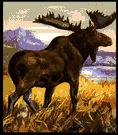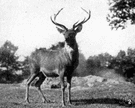elk
(redirected from elks)Also found in: Thesaurus, Medical, Acronyms, Encyclopedia.
elk
(ĕlk)n. pl. elk or elks
1. A large reddish-brown or grayish deer (Cervus canadensis) of western North America, having long, branching antlers in the male. The elk is sometimes considered a subspecies of the closely related red deer. Also called wapiti.
2. Chiefly British The moose.
3. A light, pliant leather of horsehide or calfskin, tanned and finished to resemble elk hide.
[Middle English, the European elk or moose (Alces alces), probably alteration of Old English eolh.]
Word History: In British English, elk refers to the species of large deer (scientific name Alces alces) known as moose in North America. In North American English, elk refers to a completely different species of deer, Cervus canadensis, that is closely related to the red deer (Cervus elaphus) of Europe. How did this confusing situation come about? The word elk comes from Old English eolh and originally referred to A. alces. Although the animal called eolh became extinct in Great Britain before AD 1000, the English were still aware of its existence on the continent, and so the word eolh survived into Middle English as elk. By the 17th century, due to hunting and the increase in human population, the red deer had also become scarce in the southern part of England, although some were maintained on wealthy estates to be hunted for sport. The average English person would thus have had only a vague knowledge of the red deer (C. elaphus), while the elk (A. alces) would have simply been a very large deer of distant Scandinavia known only by reputation. When English settlers arrived in North America, however, they were suddenly face-to-face with two large deer species and needed words to distinguish them. Although the elk (A. alces) was abundant, settlers did not identify it with the elk of Europe. Instead, they began calling it a moose, using a word borrowed from an Algonquian language of eastern North America. This left the name elk still available, and the English settlers gave it to a large deer, C. canadensis, that resembles the red deer of Europe. To add to the confusion, C. canadensis—the animal that North Americans call elk—is sometimes considered a subspecies of the red deer (C. elaphus). In North America, therefore, the words elk and red deer are sometimes treated as synonyms, both referring to the species C. elaphus.
American Heritage® Dictionary of the English Language, Fifth Edition. Copyright © 2016 by Houghton Mifflin Harcourt Publishing Company. Published by Houghton Mifflin Harcourt Publishing Company. All rights reserved.
elk
(ɛlk)n, pl elks or elk
1. (Animals) a large deer, Alces alces, of N Europe and Asia, having large flattened palmate antlers: also occurs in North America, where it is called a moose
2. (Animals) American elk another name for wapiti
3. (Tanning) a stout pliable waterproof leather made from calfskin or horsehide
[Old English eolh; related to Old Norse elgr, Old High German elaho, Latin alcēs, Greek alkē, elaphos deer]
Collins English Dictionary – Complete and Unabridged, 12th Edition 2014 © HarperCollins Publishers 1991, 1994, 1998, 2000, 2003, 2006, 2007, 2009, 2011, 2014
elk
(ɛlk)n., pl. elks, (esp. collectively) elk for 1, 2.
1. Also called wapiti. a large North American deer, Cervus canadensis.
2. the moose, Alces alces.
3. pliable leather made from elk hide or from skin, as cowhide, tanned to resemble it.
4. (cap.) a member of a fraternal organization (Benevolent and Protective Order of Elks) that supports various charitable causes.
[before 900; Middle English; Old English eolc,eolh]
Random House Kernerman Webster's College Dictionary, © 2010 K Dictionaries Ltd. Copyright 2005, 1997, 1991 by Random House, Inc. All rights reserved.
ThesaurusAntonymsRelated WordsSynonymsLegend:
Switch to new thesaurus
| Noun | 1. |  elk - large northern deer with enormous flattened antlers in the male; called `elk' in Europe and `moose' in North America elk - large northern deer with enormous flattened antlers in the male; called `elk' in Europe and `moose' in North AmericaAlces, genus Alces - elk or moose |
| 2. |  elk - large North American deer with large much-branched antlers in the male elk - large North American deer with large much-branched antlers in the maleCervus, genus Cervus - the type genus of the Cervidae | |
| 3. |  elk - common deer of temperate Europe and Asia elk - common deer of temperate Europe and AsiaCervus, genus Cervus - the type genus of the Cervidae hind - a female deer, especially an adult female red deer brocket - male red deer in its second year |
Based on WordNet 3.0, Farlex clipart collection. © 2003-2012 Princeton University, Farlex Inc.
elk
nounRelated words
collective noun gang
collective noun gang
Collins Thesaurus of the English Language – Complete and Unabridged 2nd Edition. 2002 © HarperCollins Publishers 1995, 2002
Translations
أيِّل كَبيرأيِّل كَبير شَمال أمْريكي
los
elgelsdyrwapiti
alko
põder
hirvi
jávorantilop
elgur
alces
briedisvapitis
alnisZiemelamerikas alnis
los
älg
elkiri geyikKanada geyiği
Collins Spanish Dictionary - Complete and Unabridged 8th Edition 2005 © William Collins Sons & Co. Ltd. 1971, 1988 © HarperCollins Publishers 1992, 1993, 1996, 1997, 2000, 2003, 2005
Collins English/French Electronic Resource. © HarperCollins Publishers 2005
elk
n → Elch m
Collins German Dictionary – Complete and Unabridged 7th Edition 2005. © William Collins Sons & Co. Ltd. 1980 © HarperCollins Publishers 1991, 1997, 1999, 2004, 2005, 2007
Collins Italian Dictionary 1st Edition © HarperCollins Publishers 1995
elk
(elk) noun – plurals elks ~elk –1. the largest of all deer, found in the north of Europe and Asia.
2. a large North American deer.
Kernerman English Multilingual Dictionary © 2006-2013 K Dictionaries Ltd.